- –ú–į—Ä—Ą–ĺ-–ú–į—Ä–ł–ł–Ĺ—Ā–ļ–į—Ź –ĺ–Ī–ł—ā–Ķ–Ľ—Ć –ľ–ł–Ľ–ĺ—Ā–Ķ—Ä–ī–ł—Ź
- –ü—Ä–Ķ–Ņ–ĺ–ī–ĺ–Ī–Ĺ–ĺ–ľ—É—á–Ķ–Ĺ–ł—Ü–į –ē–Ľ–ł—Ā–į–≤–Ķ—ā–į
- –ė—Ā—ā–ĺ—Ä–ł—Ź –ě–Ī–ł—ā–Ķ–Ľ–ł
- –•—Ä–į–ľ—č
- –°–≤—Ź—ā—č–Ĺ–ł
- –°–ĺ–Ī–ĺ—Ä –ú–į—Ä—Ą–ĺ-–ú–į—Ä–ł–ł–Ĺ—Ā–ļ–ł—Ö —Ā–≤—Ź—ā—č—Ö
- –ü—Ä–į–∑–ī–Ĺ–ł–ļ–ł –ě–Ī–ł—ā–Ķ–Ľ–ł
- –ė–≥—É–ľ–Ķ–Ĺ–ł—Ź –ł —Ā–Ķ—Ā—ā—Ä—č –ľ–ĺ–Ĺ–į—Ā—ā—č—Ä—Ź
- –Ē—É—Ö–ĺ–≤–Ķ–Ĺ—Ā—ā–≤–ĺ –ě–Ī–ł—ā–Ķ–Ľ–ł
- –ü–ĺ–ī–≤–ĺ—Ä—Ć–Ķ –≤ —Ā–Ķ–Ľ–Ķ –ö–į–ľ–Ķ–Ĺ–ļ–ł
- –ü–ĺ–ī–≤–ĺ—Ä—Ć–Ķ –≤ –ī–Ķ—Ä–Ķ–≤–Ĺ–Ķ –í–Ľ–į–ī—č—á–Ĺ—Ź
- –ü–į–Ľ–ĺ–ľ–Ĺ–ł–ļ–į–ľ
- –†–į—Ā–Ņ–ł—Ā–į–Ĺ–ł–Ķ –Ī–ĺ–≥–ĺ—Ā–Ľ—É–∂–Ķ–Ĺ–ł–Ļ
- –ü—Ä–Ķ–ī—Ā—ā–ĺ—Ź—ā–Ķ–Ľ—Ć
- –í–Ķ–Ľ–ł–ļ–į—Ź –ļ–Ĺ—Ź–≥–ł–Ĺ—Ź –ē–Ľ–ł–∑–į–≤–Ķ—ā–į –§–Ķ–ĺ–ī–ĺ—Ä–ĺ–≤–Ĺ–į
- –ě –ľ–ĺ–Ĺ–į—ą–Ķ—Ā—ā–≤–Ķ
- –ó–į–ļ–į–∑ –Ņ–ĺ–ľ–ł–Ĺ–ĺ–≤–Ķ–Ĺ–ł–Ļ –≤ –ě–Ī–ł—ā–Ķ–Ľ–ł
- –ó–į–ļ–į–∑ –Ņ–ĺ–ľ–ł–Ĺ–ĺ–≤–Ķ–Ĺ–ł–Ļ –≤ –°–ļ–ł—ā—É –ě–Ī–ł—ā–Ķ–Ľ–ł
- –ó–į–ī–į—ā—Ć –≤–ĺ–Ņ—Ä–ĺ—Ā —Ā–≤—Ź—Č–Ķ–Ĺ–Ĺ–ł–ļ—É
- –ü—Ä–ĺ–Ņ–ĺ–≤–Ķ–ī–ł –ł –Ī–Ķ—Ā–Ķ–ī—č
- –°–ĺ—Ü–ł–į–Ľ—Ć–Ĺ–ĺ–Ķ —Ā–Ľ—É–∂–Ķ–Ĺ–ł–Ķ
- –ú—č –ł –Ĺ–į—ą–į –ľ–ł—Ā—Ā–ł—Ź
- –°–ĺ—Ü–ł–į–Ľ—Ć–Ĺ—č–Ķ –Ņ—Ä–ĺ–Ķ–ļ—ā—č
- –£—Ö–ĺ–ī –∑–į —ā—Ź–∂–Ķ–Ľ–ĺ–Ī–ĺ–Ľ—Ć–Ĺ—č–ľ–ł
- –¶–Ķ–Ĺ—ā—Ä —Ā–Ķ–ľ–Ķ–Ļ–Ĺ–ĺ–≥–ĺ —É—Ā—ā—Ä–ĺ–Ļ—Ā—ā–≤–į –ī–Ķ—ā–Ķ–Ļ-—Ā–ł—Ä–ĺ—ā –ł –ī–Ķ—ā–Ķ–Ļ, –ĺ—Ā—ā–į–≤—ą–ł—Ö—Ā—Ź –Ī–Ķ–∑ –Ņ–ĺ–Ņ–Ķ—á–Ķ–Ĺ–ł—Ź —Ä–ĺ–ī–ł—ā–Ķ–Ľ–Ķ–Ļ
- –¶–Ķ–Ĺ—ā—Ä —Ä–Ķ–į–Ī–ł–Ľ–ł—ā–į—Ü–ł–ł –ī–Ķ—ā–Ķ–Ļ —Ā –Ē–¶–ü
- –Ē–Ķ—ā—Ā–ļ–į—Ź –≤—č–Ķ–∑–ī–Ĺ–į—Ź –Ņ–į–Ľ–Ľ–ł–į—ā–ł–≤–Ĺ–į—Ź —Ā–Ľ—É–∂–Ī–į
- –†–į–∑–≤–ł–≤–į—é—Č–ł–Ļ —Ü–Ķ–Ĺ—ā—Ä –ī–Ľ—Ź –ī–Ķ—ā–Ķ–Ļ —Ā –Ē–¶–ü
- –ē–Ľ–ł–∑–į–≤–Ķ—ā–ł–Ĺ—Ā–ļ–ł–Ļ –ī–Ķ—ā—Ā–ļ–ł–Ļ –ī–ĺ–ľ
- –°–Ľ—É–∂–Ī–į –ī–ĺ–Ī—Ä–ĺ–≤–ĺ–Ľ—Ć—Ü–Ķ–≤
- –°–Ľ—É–∂–Ī–į –Ņ–ĺ–ľ–ĺ—Č–ł –Ĺ—É–∂–ī–į—é—Č–ł–ľ—Ā—Ź ¬ę–†–į–Ī–ĺ—ā–į —Ā–ĺ —Ā–Ľ—É—á–į–Ķ–ľ¬Ľ
- –†–Ķ—Ā—É—Ä—Ā–Ĺ—č–Ļ —Ü–Ķ–Ĺ—ā—Ä
- –ü–į—ā—Ä–ĺ–Ĺ–į–∂–Ĺ–į—Ź —Ā–Ľ—É–∂–Ī–į
- –ö–į–ļ –Ņ–ĺ–ľ–ĺ—á—Ć –ě–Ī–ł—ā–Ķ–Ľ–ł
- –†–Ķ–≥—É–Ľ—Ź—Ä–Ĺ–į—Ź –Ņ–ĺ–ľ–ĺ—Č—Ć
- –Ď–Ľ–į–≥–ĺ–ī–į—Ä–Ĺ–ĺ—Ā—ā–ł
- –ě—ā—á—Ď—ā—č —Ā–ĺ—Ü–ł–į–Ľ—Ć–Ĺ—č—Ö –Ņ—Ä–ĺ–Ķ–ļ—ā–ĺ–≤
- –ü–ĺ–ī–Ņ–ł—Ā–į—ā—Ć—Ā—Ź –Ĺ–į –Ĺ–ĺ–≤–ĺ—Ā—ā–ł
- –Ē–ĺ–ľ-–ľ—É–∑–Ķ–Ļ –í–Ķ–Ľ–ł–ļ–ĺ–Ļ –ļ–Ĺ—Ź–≥–ł–Ĺ–ł –ē–Ľ–ł–∑–į–≤–Ķ—ā—č –§–Ķ–ĺ–ī–ĺ—Ä–ĺ–≤–Ĺ—č
- –ź–Ĺ–ĺ–Ĺ—Ā—č –ľ–Ķ—Ä–ĺ–Ņ—Ä–ł—Ź—ā–ł–Ļ
- –ě–Ī—É—á–Ķ–Ĺ–ł–Ķ
- –Ď–ł–Ī–Ľ–ł–ĺ—ā–Ķ–ļ–į
- –ź—Ā—Ā–ĺ—Ü–ł–į—Ü–ł—Ź —Ā–Ķ—Ā—ā—Ä–ł—á–Ķ—Ā—ā–≤
- –Ē–ĺ–Ī—Ä–ĺ–≤–ĺ–Ľ—Ć—Ü—č
- –í–į–ļ–į–Ĺ—Ā–ł–ł
- –Ē–ĺ–ļ—É–ľ–Ķ–Ĺ—ā—č
- –ö–ĺ–Ĺ—ā–į–ļ—ā—č
- –ď—Ä—É–Ņ–Ņ–į –Ņ–ĺ —Ä–į–Ī–ĺ—ā–Ķ —Ā –Ņ—Ä–ĺ—Ā–ł—ā–Ķ–Ľ—Ź–ľ–ł
- –°–Ņ—Ä–į–≤–ĺ—á–Ĺ–į—Ź —ā–Ķ–Ľ–Ķ—Ą–ĺ–Ĺ–Ĺ–į—Ź —Ā–Ľ—É–∂–Ī–į –Ņ–ĺ–ľ–ĺ—Č–ł ¬ę–ú–ł–Ľ–ĺ—Ā–Ķ—Ä–ī–ł–Ķ¬Ľ
- –ē–Ľ–ł–∑–į–≤–Ķ—ā–ł–Ĺ—Ā–ļ–ł–Ļ –ī–Ķ—ā—Ā–ļ–ł–Ļ –ī–ĺ–ľ
- –¶–Ķ–Ĺ—ā—Ä —Ā–Ķ–ľ–Ķ–Ļ–Ĺ–ĺ–≥–ĺ —É—Ā—ā—Ä–ĺ–Ļ—Ā—ā–≤–į
- –ē–Ľ–ł–∑–į–≤–Ķ—ā–ł–Ĺ—Ā–ļ–ł–Ļ —Ā–į–ī
- –ú–Ķ–ī–ł—Ü–ł–Ĺ—Ā–ļ–ł–Ļ —Ü–Ķ–Ĺ—ā—Ä "–ú–ł–Ľ–ĺ—Ā–Ķ—Ä–ī–ł–Ķ"
- –°–Ľ—É–∂–Ī–į –ī–ĺ–Ī—Ä–ĺ–≤–ĺ–Ľ—Ć—Ü–Ķ–≤
- –ē–Ľ–ł–∑–į–≤–Ķ—ā–ł–Ĺ—Ā–ļ–į—Ź –≥–ł–ľ–Ĺ–į–∑–ł—Ź
- –Ē—Ä—É–≥–ł–Ķ –ļ–ĺ–Ĺ—ā–į–ļ—ā—č
–ú–į—Ä—Ą–ĺ-–ú–į—Ä–ł–ł–Ĺ—Ā–ļ–į—Ź –ĺ–Ī–ł—ā–Ķ–Ľ—Ć –ľ–ł–Ľ–ĺ—Ā–Ķ—Ä–ī–ł—Ź —Ā–Ķ–≥–ĺ–ī–Ĺ—Ź
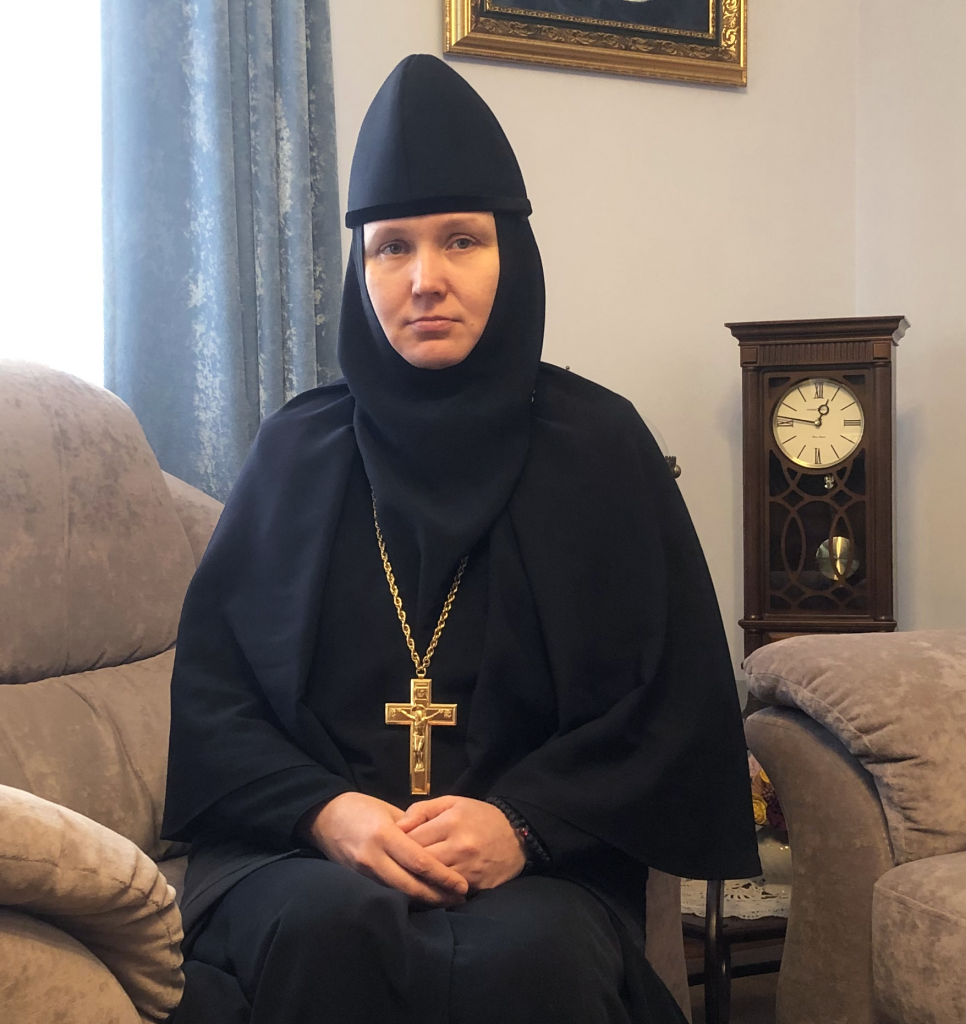 In 2021, The Saints Martha and Mary Convent of Mercy turned one hundred and twelve years.
In 2021, The Saints Martha and Mary Convent of Mercy turned one hundred and twelve years.
We talked with the abbess of the Saints Martha and Mary Convent of Mercy, the Mother Superior Elizabeth (Pozdnyakova), about the current life in the Convent; how the pray itself correlates with the aid to our people; who now continues the way as sisters, who laboured in the Saints Martha and Mary Convent of Mercy at the beginning of the last century.
The Saints Martha and Mary Convent of Mercy today
Mother Superior, according to the books and the evidence of our contemporaries, we can have a view of the life at the beginning of the last century and the role of the Saints Martha and Mary Convent of Mercy at that time. Could you, please, tell us ‚Äď what the current life in the Convent ‚Äď consist of and what is the main and determining factor in its activities today?
‚Äď Having inherited such a sacred place as the Saints Martha and Mary Convent of Mercy, we, certainly, have a great responsibility for all that happens here today. Modern life of the Convent is closely connected with those ideas that were laid down as a basis at the time when the Saints Martha and Mary Convent of Mercy was founded by the Holy Martyr, Elizabeth.
And today doing here many things, such as social service, we think that our main aim is to become real Christians, precisely because the Grand Duchess Elizabeth Feodorovna wanted to serve God and aspired to the Sacred Life. And our aim, first of all, is to show the way to the Sacred Life. It must help us to become Christ’s. And here lies the aim of our way.
You became a Part of the Saints Martha and Mary Convent of Mercy ten years ago and what was the situation at that time?
‚Äď When I was appointed here, the Convent was going through a turning point: large-scale restoration from its ruins had just finished, and the Convent had received its modern view.
My predecessor, Natalya Anatolyevna Moliboga, put a lot of energy, heart and soul into restoration. And that life, for which the Convent was created, only began.
And so it happened that the revival of this life for the most part fell to our lot.
In 2011 I had a task to realize what the Saints Martha and Mary Convent of Mercy is in modern realities. By that time, 100 years had passed since its creation, and we understood that it was impossible to recreate the Convent the way it was under the Grand Duchess Elizabeth Feodorovna. And that would be wrong, because in that case it would be as a historical artifact; which is irrelevant today.
It was necessary for us to realize through the experience of the predecessors what should be done in modern conditions. The projects that we are working on appear naturally from the actual needs of the society, from everything that happened around. Where our help was needed, we began to act.
During these ten years we hit a certain milestone and try to realize now our experience and understand where to move further.
How do you see the further activity of the Saints Martha and Mary Convent of Mercy?
‚Äď We have come to understand that today, so as at the times of the Grand Duchess Elizabeth Feodorovna, we should go to those people who are suffering at the moment, and who have no one to help: there are people, who are not provided with help from the State and social organizations.
But if we see that there some areas of assistance in the Convent are successfully developing outside without our involvement, we may no more work in that direction and do something else instead.
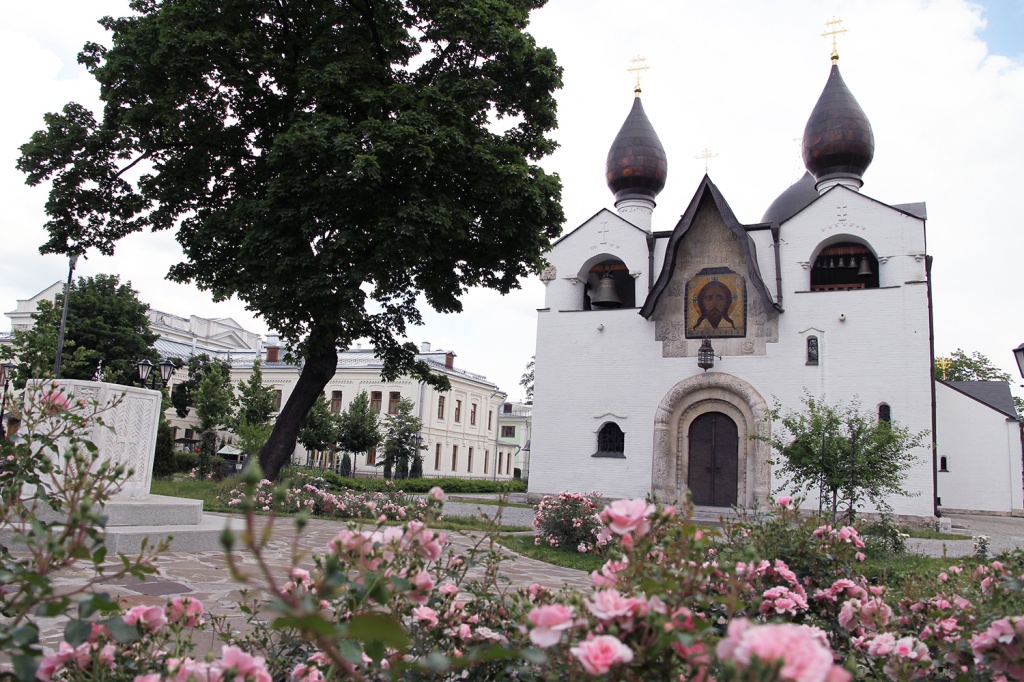
What do you think the main result of this decade?
‚Äď Probably, it is not for us to evaluate what we do. But for me, the main result of these ten years is people, who have gathered here.
I see how unique every person is, that he or she come here not by chance and that especially was visible over the course of ten years during which a large convent family has gathered.
One our good friend asked me why I praise my employers all the time. And I do not praise them; it is just my heart which is overflowing with gratitude for these people. And not only for the sisters, employees and volunteers, but also for those who come here for help.
Now we have a close-knit monastic community, where sisters care for each other very much and value their stay in the Saints Martha and Mary Convent of Mercy. They try to live monastic life; they treat with reverence the memory of their Saint Founder of the Convent.
The Monastic Life
Mother Superior, what do you think is the most important thing in monastic life? It seems that monastic life has been the same for hundreds of years, but the answers to this question can be different.
‚Äď In short, it is the spiritual guidance. And it is based on the love of the novice for his guide and the guide for the novice, and the respect of the guide for the free will of a novice. That is important. And in what conditions and where it is implemented is not so important.
And what is the most important in the relations between sisters?
‚Äď The relations between sisters also depend on the spiritual guidance.
But, certainly, there must be love and silence in the Convent.
The Monastic life is difficult. A person comes to work on himself, in a sense, even to break himself and bring him in line with Gospel ideals. It is hard work. If, in addition to this, we also begin to annoy each other somehow, then it becomes many times harder.
But even if there is some disorder in the Convent, the most important thing in the monastic life is the spiritual guidance. It is the confessor or the abbess, if she provides spiritual guidance, who determines the nun’s attitude to everything that happens.
Our holy predecessors, the new martyrs, many of whom led a monastic life, remained monks in all the situations: in camps, in exile, in the most difficult conditions. Certainly, it is good that today our Church is flourishing, which may have never been before, but the correct monastic life should not depend on this.
When there were persecutions on the Christians, the monks always survived just because the external part of life was not the defining one.
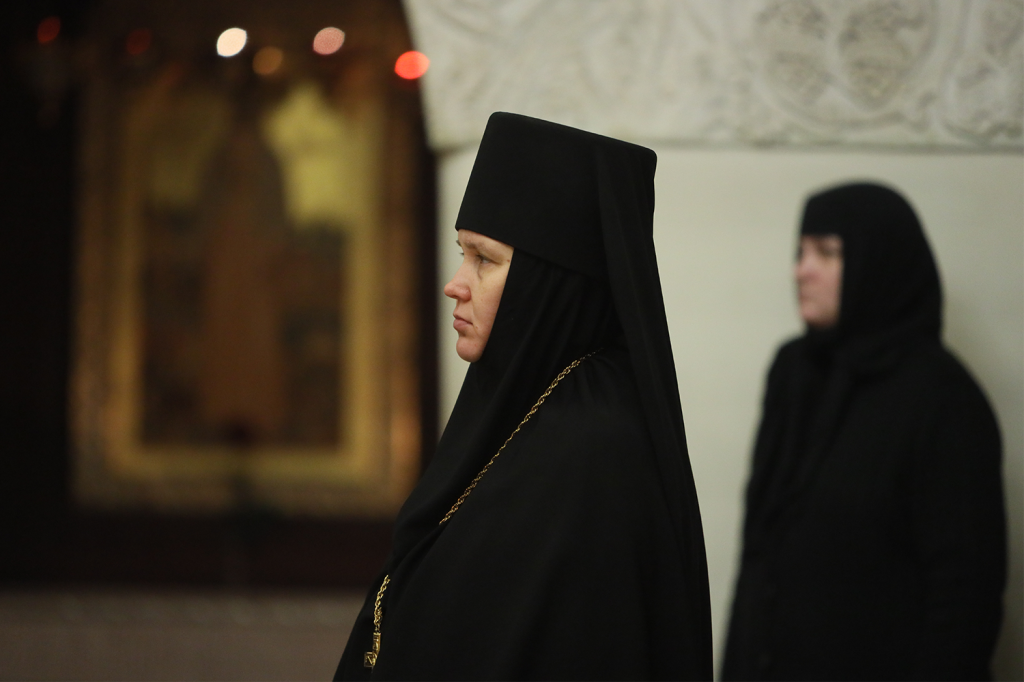
How did you cope with the difficulties in arranging the monastic life in the Convent ten years ago, when you were first appointed the abbess of the Convent?
‚Äď I had quite a lot of experience in monastic life, but I had no experience of guidance. And, of course, I was taught different things. Not a single monk wants to be superior; such an idea would not come to his mind. The monk is taught obedience, to do what is necessary, and pay no attention to some imperfection of other, to what is happening around. It was hard to readjust. I gradually began to realize that the questions ‚ÄúWhy did a hole appear here?‚ÄĚ or ‚ÄúWhy does the sister behave in such a way?‚ÄĚ now are directly related to me. Now I have to know everything about everyone, take care of everything. At first it scared me. And although there were still a few sisters at that time, it was necessary to provide for their life. I could not figure out myself how to do this, so I turned to prominent people with experience in the spiritual life. And I still ask them for advice.
And what is the most difficult in organizing the monastic life?
‚Äď Attention to yourself is very important here: if you weaken a little in your attention, then the devil immediately takes possession of you. Moreover, our Convent is located in the centre of Moscow; there are a lot of people and different information around. It is important to protect yourself from all the external things so that the mind does not become scattered and filled with unnecessary things.
How many sisters are there in the Convent, what are their duties?
‚Äď We have a little over forty sisters. The obediences are classic for every convent ‚Äď duties in the church, in the canteen, cleaning, etc. Now there are only three sisters of mercy left, the rest of the sisters have taken monastic vows. There is also a sisterhood, in which there are about ten people, these are sisters who do not live in the Convent, but regularly help us.
We also have a lot of volunteers who help us. All of them, like our employees, are in fact the sisters of mercy who served here under Elizabeth Feodorovna. They also come here to serve Christ. Sisters, who lead a monastic life, are not involved in social work.
Why are there so few sisters of mercy left?
‚Äď Now social service is not the stimulus for which people leave the world.
At the times of Elizabeth Feodorovna all was different. Then, for a social service, a woman had to either be an aristocrat and do charity work, or join some organization ‚Äď a sisterhood of mercy or the Saints Martha and Mary Convent of Mercy.
Today, the social activity of the Church is the prerogative mainly of the laity. And that’s why I think that our employees and our volunteers are exactly the sisters of mercy that the Grand Duchess Elizabeth Feodorovna gathered around her.
Do you still accept sisters who want to become nuns?
‚Äď Yes, we do. Today it cannot be said that there is a lot of people who want to devote themselves to monasticism, but we always have sisters on probation.
Could you tell us, please, about the volunteers in the Convent; how do people decide to help?
‚Äď In my subjective opinion, today‚Äôs youth are in many ways better than us. This generation was grown up on the different social values. These are young people who grew up on other social values. If the possibility of charity or some kind of social work was something new and akin to a feat for us, for the majority of modern youth it is a common thing, a natural need of the soul.
We see a large number of volunteers not only in church social work. There are tens of thousands of them, which is very good. And we have a volunteer organization in the Convent, it consists of people who want to help our projects.
They have formed a circle of like-minded people in the Convent; they communicate, even create families, and join church life together. And this is great, it’s the right way. It is difficult to imagine where people can meet today. People used to get acquainted at balls, then on trips to collective farms for potatoes. But in order to create a family, there should be platforms that reveal a person, where he becomes real. It is said that when we get tired, we become ourselves. And volunteer service is a place where people show themselves, especially in common work.
Social service
Social projects mean a large number of employees. It seems that you are not only the abbess of the Convent, but also the leader for several hundred people. What is the secret that such a huge system works without failures?
‚Äď Actually, I can hardly be considered a classical leader. Around me, as I have already said, there are a lot of wonderful people and everything is done by their efforts, their burning hearts. I always thank God that there are no indifferent people here, and no one needs to be urged on. Every person is passionate about his work.
Well, not everything works out for us and not everything goes as it should do. But our common task is not to do as many things as possible. Our common goal is to come to Christ.
And when there is a desire to speed up the process, one has to think a thousand times whether it is necessary now, and what it will lead to.
After all, often tough leadership doesn‚Äôt create, but destroys. I perceive it as my obedience. The sisters go out every day to their duties, for example, to set the table, and I go out to my own ‚Äď to communicate with people. I can‚Äôt do anything myself, I can only somehow inspire, support, direct.
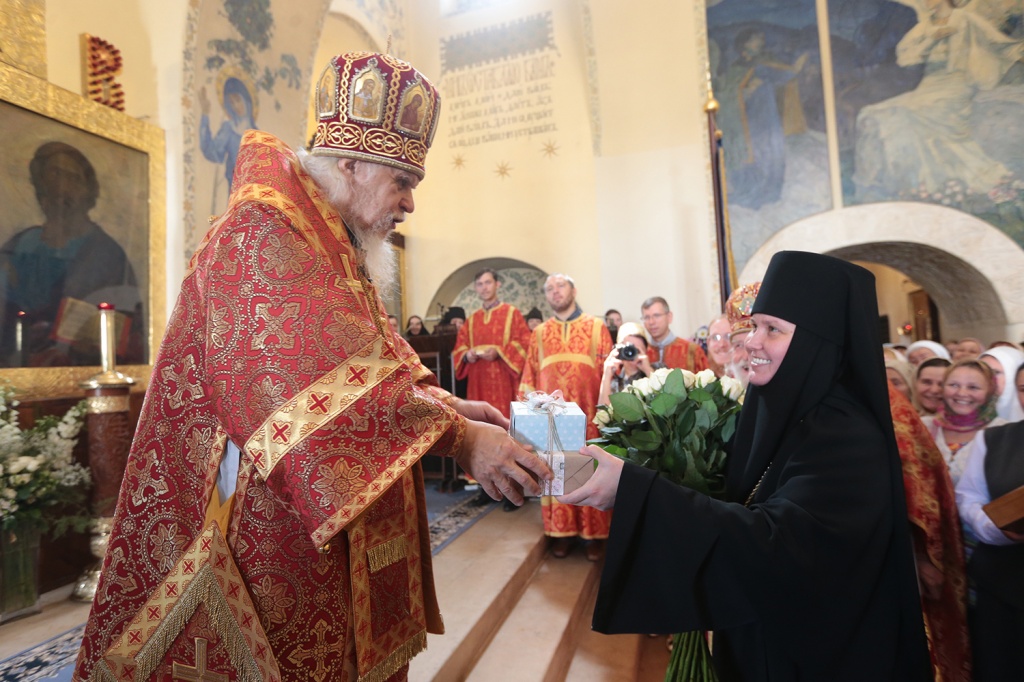
Does social service interfere with monastic life?
‚Äď In monastic life, is doesn‚Äôt matter at all what you do, there is little that can interfere with it. The main thing is that this monastic life exists and the main focus doesn‚Äôt shift anywhere.
How do you see the future of social projects, what areas do you plan to develop?
‚Äď We have a vision for the future for almost all of our eight projects (Social projects are implemented together with the Orthodox help service ¬ęMercy¬Ľ). Today we have a goal ‚Äď to create a professional patronage service. To the great extent, it still mostly works on a voluntary basis. Today the care for the sick is a huge problem for the families in need. These are most of all aged people, large, troubled families. There is a very great need for patronage nurses who could go to such people and provide them with assistance at home.
There are many services of this kind in Moscow now, but they are all commercial, and the people we are speaking of, can’t afford their services.
There are still new directions that we would like to develop, but we are not ready to announce them.
And our respite care (a round-the-clock stay group for the ill children) stopped its work, since quite a few of children’s hospices and mobile teams have opened in Moscow. We considered that our very small respite care is not relevant anymore. All other projects are still working.
Do people turn to you personally for help?
‚Äď Yes, certainly, all the time. The Convent is a place where everyone comes ‚Äď both petitioners and those who want to help. That‚Äôs why our employees and sisters always must be ready to help.
Our task is to change ourselves and then the world around us will change
How and in what situations do you turn to the experience of the Grand Duchess Elizabeth Feodorovna? How does it help and support you?
‚Äď The Grand Duchess Elizabeth Feodorovna is our guide. Every morning the sisters sing a canon to her asking for help and we are guided by her example.
The main thing is not creating more social projects, but to help people come to Christ through what we do. And the image of the Holy Martyr helps us not to forget this. Because there is always a danger ‚Äď to turn off the original path and start doing things for the sake of doing things.
And the fact that her values and aspirations were true was testified with her martyrdom, till the last she thought about those who were near her.
What surprises you most in her personality?
‚Äď What attracts me most in her life is loyalty to God, integrity. First, she converts to Orthodoxy, because she sees the truth in it. After her husband‚Äôs death, she continues to follow the same way: earlier she served her husband, as it is written in the Gospel, and then she rises to the next step and continues to serve God helping others.
After the events of 1917, she could have left Russia, but she realized that she had to go her way to the end, in this country and with the people who were nearby. She also felt her Christian mission in this. We see from the documents, letters how firm she was on this path.
Someone was frightened, someone fought, but she did not try to resist, she calmly ascended this Golgotha as if along the path intended by God.
We are very happy that we have such an example in front of us, and looking at it, we can try to cultivate in ourselves these wonderful qualities that the Grand Duchess Elizabeth Feodorovna had ‚Äď integrity, peace of mind, and trust in God.
Why didn’t she try to resist everything if she understood what was going to happen because they repeatedly came to arrest her?
‚Äď She accepted everything as from the hands of God. And in the Convent, the Grand Duchess Elizabeth Feodorovna tried to change the life around her and didn‚Äôt go where she was not asked. She did what she could do herself. Actually, this is a task for each of us. Do not go outside with demonstrations, but try to change yourself and the world around you, only then some changes are possible.
How did the pandemic change the life in the Convent?
‚Äď Fundamentally, nothing has changed, except some restrictions. There are fewer people in the church, it seems that people are scared. It has become a little quieter with fewer events and activities. And for the sisters nothing has changed at all.
It is very difficult today for people who do not have religious belief. I can‚Äôt imagine how you can experience all this without belief if you don‚Äôt rely on God and hope for eternal life. When you realize that you have the only life, you put so many efforts to achieve something, and suddenly everything collapses due to the virus ‚Äď this is a tragedy for people.
This is a lesson for all of us ‚Äď we must learn to trust God. There are many different tragedies ‚Äď wars, epidemics, and the coronavirus is not the most terrifying of them. It is impossible to avoid such things, so, our task is to help each other in such moments, to take special care of each other.
And I see that people have become somehow more careful with each other, now the words ‚Äúsuccess‚ÄĚ and ‚Äúcareer‚ÄĚ are heard less often. If earlier people came to me and talked about their business matters, now they often speak of those who are nearby. This is very touching, and this is also one of the results of the pandemic.
Many churches, monasteries faced a difficult financial situation. How did the Convent survive this time, did it affect those who traditionally received help in the Convent?
‚Äď Our situation is the same as everywhere else. It is hard for everybody, including those people who helped us earlier. We also try to support them. In some things we had to tighten our belts tougher. There‚Äôs the hand of God for everything.
At the same time, it must be said that individuals began to donate more. With people, especially the Russians, this always happens. In difficult situations, all the best is resurrected in the soul, they begin to help each other. Probably, it is also an indicator of the resurrection of the human spirit. Difficulties mobilize us, and our best qualities become more obvious.
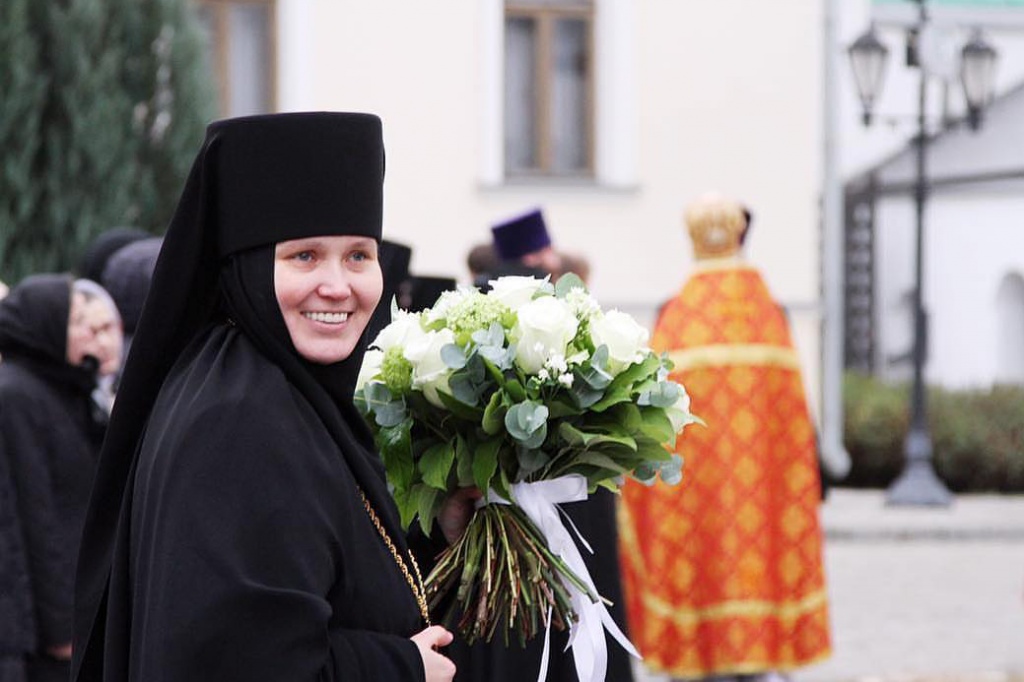
What are you glad of most of all, and what, on the other hand, upsets you in your daily life?
‚Äď In both cases, the people who fill my life. These are sisters, employees, congregation, and petitioners. All my joys and sorrows are connected with them.
Do you look into the future of the Convent? What is it?
‚Äď I recall the words from a poem by Archdeacon Roman (Tamberg): ‚ÄúWe are travelers on the eternal journey, and we must always try, to go, just go and go‚ÄĚ. If God finds us on the way, I think that everything will be fine.
February of 2021
The interview by Julia Semenova









